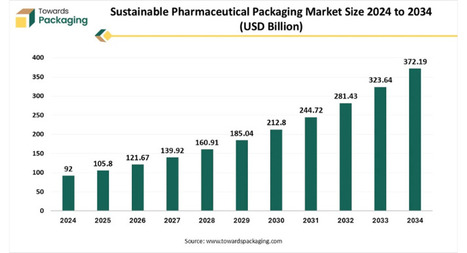 Your new post is loading...

|
Scooped by
EcoVadis
April 25, 3:29 AM
|
Cherwell is to highlight its range of products for environmental monitoring and process validation in sterile medicinal product manufacturing and how these complement other products within its parent company AnalytiChem.
Cherwell will be exhibiting at Pharmig’s 32nd Annual Conference, Nottingham, 20-21 November, which is focusing on “Hot Topics in Pharmaceutical Microbiology.”
Cherwell will be joined by colleagues from the AnalytiChem team, seeking to learn more about how to best support Cherwell and its pharmaceutical microbiology focused customers.

|
Scooped by
EcoVadis
April 25, 3:26 AM
|
Glenn Petrie, commercial director – healthcare, Plastic Ingenuity, explores the challenges and successes of transitioning to a circular economy.
The demand for sustainable packaging is growing in every industry, but the challenges inherent in the protection and shipping of medical devices are assuredly greater than most. The first and most obvious reason is that medical devices significantly aid or even save lives, so their intact arrival is of paramount importance. The second hurdle is that many medical devices are delicate, high-precision apparatuses and require packaging that ensures instrumentation arrives completely free of damage or displacement.

|
Scooped by
EcoVadis
April 25, 3:23 AM
|
Pharma Tech Industries, a global provider of contract manufacturing and packaging solutions for pharmaceutical, OTC, and nutritional and products, has received highest-possible marks in its recent Carbon Disclosure Project evaluation.

|
Scooped by
EcoVadis
April 25, 3:23 AM
|
European Pharmaceutical Review’s latest Pharma Horizons report provides insight on key sustainability developments in the pharmaceutical industry and covers topics including regulation, manufacturing and clinical development.
This report delves into the latest developments in sustainability impacting the pharmaceutical sector today. Inside, articles explore current key topics including regulation, manufacturing, green chemistry, digitalisation and clinical trials.

|
Scooped by
EcoVadis
April 25, 3:21 AM
|
Advancements in drug manufacturing technologies are reshaping global regulatory frameworks. This shift is largely driven by the integration of artificial intelligence (AI)-powered models, cloud-based platforms, and other innovations in drug discovery and development. Looking ahead, this article highlights the key trends expected to shape the regulatory landscape of pharmaceutical manufacturing in 2025.

|
Scooped by
EcoVadis
April 25, 3:19 AM
|
In its bid to reduce the climate footprint of the medical industry, the World Health Organization has issued a call for action to fuel sustainability in the pharmaceutical sector.
New standards, a digital transformation and more collaborative regulatory procedures for pharmaceutical companies are among the steps policymakers need to take to greenify the medical sector, according to the World Health Organization (WHO).
Through its Department of Regulation and Prequalification, the global health authority is calling on regulators to establish new standards to enable a “quick and supported transformation” of the medical products industry.

|
Scooped by
EcoVadis
April 25, 3:17 AM
|
The World Business Council for Sustainable Development (WBCSD), in collaboration with leading pharmaceutical companies and supported by PwC UK, has published the Roadmap to Nature Positive: Foundations for the Pharmaceutical Sector (‘Roadmap’). This publication marks a critical milestone in the pharmaceutical sector’s efforts to understand its nature-related impacts and dependencies and identify key actions to drive nature-positive outcomes.

|
Scooped by
EcoVadis
April 25, 3:14 AM
|
Today, we find ourselves at a crossroads. The need for efficient healthcare is greater than ever, but so is the call for environmental responsibility. This has led to a growing global movement: the shift toward sustainable pharmaceutical packaging. Governments are implementing stricter regulations, companies are investing in eco-friendly alternatives, and consumers are becoming more conscious about their choices. Together, these forces are driving one of the most significant transformations the pharmaceutical industry has ever seen.

|
Scooped by
EcoVadis
April 18, 2024 2:49 AM
|
With the treatment of many diseases depending on effective pharmaceuticals, the pollution caused by pharmaceuticals has become an emerging and concerning environmental problem.1 This article will tackle some sustainable practices that can be used in pharmaceutical manufacturing for improved health and environmental benefits.

|
Scooped by
EcoVadis
April 18, 2024 2:46 AM
|
Securing the future of our planet for future generations depends on the widespread adoption and success of carbon neutral policies and practices. Synthetic DNA manufacturers and their customers are among those leading the way. Achieving carbon neutrality is critical for industries and communities around the world as we seek to mitigate the effects of climate change, protect our environment, ensure sustainability and enhance overall public health.

|
Scooped by
EcoVadis
June 15, 2023 3:46 AM
|
Cytiva is collaborating with Terracycle, to launch the global expansion of their filtration device recycling program. Companies across a broad range of industries in six countries will have access to the Zero Waste Box to recycle their Whatman and Pall Life Sciences filtration devices. The Zero Waste Box was designed as a solution to help companies reach their sustainability goals.

|
Scooped by
EcoVadis
June 15, 2023 3:43 AM
|
As the health impacts of climate change become harder to ignore, biotechnology and pharmaceutical companies are facing increasing pressure from investors, employees, and government regulators to reduce their carbon emissions, and to make environmental sustainability a core part of their business.
Globally, large public biotech and pharmaceutical companies are responsible for more than 200 million metric tons of carbon dioxide and equivalent emissions, according to estimates from one 2022 report. The bulk of those emissions are tied to companies’ products and supply chains, which can be hard to measure. In the U.S., about 8.5% of the national carbon footprint can be attributed to the health care industry at large.

|
Scooped by
EcoVadis
June 15, 2023 3:41 AM
|
Leading pharma companies are setting targets for reducing their greenhouse gas emissions, and reporting on their progress in meeting them. That’s according to a new study we at Oxford PharmaGenesis conducted in collaboration with researchers from the University of Oxford. But when it comes to reporting on supply chain emissions, more collaboration is needed – and the time is now.
|

|
Scooped by
EcoVadis
April 25, 3:27 AM
|
To drive environmental sustainability in pharma, EFPIA strives “to go beyond compliance on the targets set within the various EU legislative requirements as part of the EU Green Deal initiatives under the Zero Pollution, Circular Economy and Climate Action plans”.

|
Scooped by
EcoVadis
April 25, 3:25 AM
|
SGD Pharma highlights its investments into the next-generation of glass manufacturing and commitment to strengthening pharma supply chains in the US and beyond.

|
Scooped by
EcoVadis
April 25, 3:23 AM
|
By: Charlie Sternberg
Piramal Pharma Limited has achieved an environmental milestone at its API and intermediates manufacturing facility in Digwal, India by converting its coal-fired steam boiler to operate on biomass briquettes, a renewable energy fuel source.
This achievement marks a substantial step toward Piramal’s sustainability goal to reduce Scope 1 and 2 greenhouse gas (GHG) emissions by 42% by 2030. The strategic conversion at the Digwal facility will eliminate approximately 24,000 tons of carbon dioxide equivalent (tCO2e) GHG emissions annually, accounting for about 17% of the company’s total emissions.

|
Scooped by
EcoVadis
April 25, 3:23 AM
|
Lonza Capsules & Health Ingredients has established a Center of Applied Sustainability. The Center will drive Lonza CHI’s sustainability strategy. It will also reduce Lonza CHI’s environmental impact through energy efficiency, waste reduction, and resource optimization initiatives.
Christine Lebeault, Head of Applied Sustainability, Lonza Capsules & Health Ingredients, commented, “As environmental concerns in the pharmaceutical and nutraceutical industries continue to grow, developers and manufacturers face increased pressure to reduce environmental impact, particularly in final dosage forms. We believe that sustainability and innovation go hand in hand, strengthening competitive advantage and contributing to a more sustainable future. With our newly established Center of Applied Sustainability, we will integrate sustainability into the early stages of product development and co-innovate with our customers to help them meet their environmental goals through responsible sourcing, manufacturing, and innovation.”

|
Scooped by
EcoVadis
April 25, 3:20 AM
|
The healthcare and pharmaceutical industry are critical to global well-being. With extensive supply chains and energy-demanding operations, the industry also faces significant challenges in reducing climate change. For pharma companies, prioritizing and striving towards reducing their environmental footprint put them in the same group as the majority of companies that today are crafting dedicated targets and/or resources to drive change and make decarbonization initiatives and budgeting a part of daily business practices.

|
Scooped by
EcoVadis
April 25, 3:18 AM
|
A team of researchers in Japan have developed a novel artificial photosynthesis method that transforms waste organic compounds into valuable pharmaceuticals and energy using sunlight and water. The approach, known as artificial photosynthesis directed toward organic synthesis (APOS), represents a major step forward in sustainable chemical manufacturing.

|
Scooped by
EcoVadis
April 25, 3:15 AM
|
Pharmaceutical packaging plays a crucial role in ensuring the safety, efficacy, and quality of medications throughout their lifecycle. By employing specialized materials and technologies, packaging protects pharmaceutical products from contamination, deterioration, and external elements that could compromise patient safety. It acts as a barrier against temperature fluctuations, moisture, light, and physical damage, preserving the integrity of the product.

|
Scooped by
EcoVadis
April 18, 2024 2:50 AM
|
Bormioli Pharma creates pharmaceutical packaging for drug stability, safety, and sustainability, partnering with global health leaders and says it stands at the forefront of sustainability.
Andrea Lodetti, chief executive officer of Bormioli Pharma (pictured), tells OSP about this breakthrough within the pharmaceutical packaging industry. In an in-depth conversation, he shares profound insights into the company's notable journey toward sustainability and its ambitious trajectory in the pharmaceutical landscape.

|
Scooped by
EcoVadis
April 18, 2024 2:47 AM
|
PCI Pharma Services, a global contract development and manufacturing organization (CDMO), has released its first Environmental, Social & Governance (ESG) Report—a detailed overview of its sustainability journey.
The report showcases the strides taken from the program’s formal inception in 2021 through its 2023 fiscal year and lays out ambitious goals for continued progress along multiple fronts.
The in-depth report discloses PCI's performance, targets, and strategy to achieve nine identified impact categories, from sustainability-focused practices concerning carbon footprint, responsible waste management and eco-conscious procurement to people-first issues such as health and safety, community impact and DEI.

|
Scooped by
EcoVadis
June 16, 2023 3:20 AM
|
Merck is a vibrant science and technology company that has been dedicated to human progress for over 350 years. In order to be successful in this mission, we have to keep people and the planet at the heart of everything we do. That is why we launched a comprehensive sustainability program¹,² across our sectors.
In the Healthcare sector, we work in a field where our commitment is to serve patients and to help improve, create and prolong lives. To do this sustainably, we must consider the impact our work has on our environment and our society.
For our Healthcare R&D team, we are at the beginning of the value chain, and this poses the important question of how our decisions have ripple effects that impact sustainability across our business. We understand that R&D is at the front line of creation for Merck and the choices we make have massive implications on the entire product life cycle. Up to 80% of the environmental impact of a product is determined at the R&D phase3.

|
Scooped by
EcoVadis
June 15, 2023 3:45 AM
|
Key insights: As China and India produce the majority of the worlds APIs which can cause supply chain disruption when combined with climate change. A decentralised approach to various aspects of clinical trials can also amplify collaboration as it reduces the environmental impact of in-person participation. If pharma companies adopt a virtual and asynchronous approach to more trial-related activities, they can proactively reduce total carbon emissions.
Today, the global pharmaceutical industry accounts for 4.4% of global greenhouse gas emissions. For every $1 million the sector made in 2015, it generated 48.55 tonnes of CO2. In the battle to curb global warming and the devastating effects it will ultimately have on people and the planet, the industry must strive to reduce emissions.

|
Scooped by
EcoVadis
June 15, 2023 3:43 AM
|
Industry 4.0 ideas are starting to win over the drug industry, according to a researcher who says the desire for more efficient, sustainable production is driving the change. The term industry 4.0—the use of interconnected, “smart” technologies in manufacturing—has been around for nearly a decade. The approach has had a dramatic impact on a variety of industries with the automotive sector being a high-profile example.
The biopharmaceutical industry, by contrast, has been slower to move in a digital direction says Manan Shah, PhD, from the school of energy technology at Pandit Deendayal Energy University in Gujarat, India.
“The adoption of Industry 4.0 technologies in biopharmaceutical manufacturing is still in its early stages compared to other industries such as automotive, manufacturing and electronics,” say Shah. The slow adoption is due to the high level of scrutiny surrounding the production of drugs.”
|





 Your new post is loading...
Your new post is loading...


























